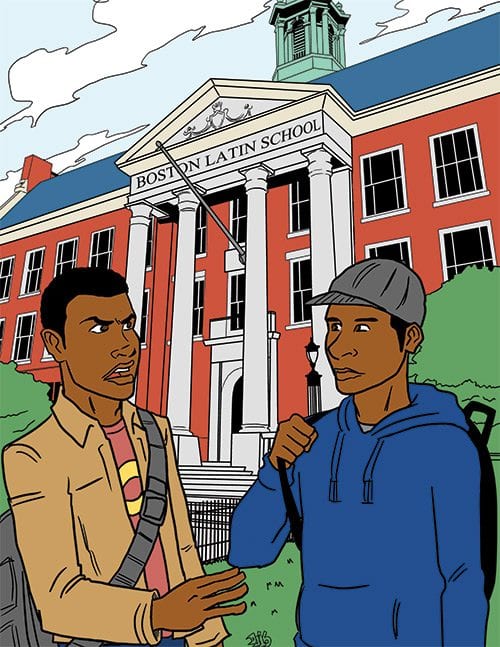
Students at the Boston Latin School are among the most intellectually gifted in the Commonwealth. Upon graduation they attend the nation’s most prestigious universities. They then become prominent in business, the professions and the humanities. Unfortunately, academic acuity in the teenage years is not always accompanied with wisdom, kindness and common courtesy.
The sociology of success might even be destructive to the more civilized human qualities. Students admitted to Boston Latin are the academic leaders of their elementary schools, a position they have always taken for granted. For many of them it is the first time that they have been in the company of their academic peers. It might be harrowing for some to be confronted for the first time by those able to dislodge them from the status of the academic elite.
In earlier decades the spirit of competition was stimulated by the administration. Newly arrived seventh graders were told at their first assembly, “Look to your right and then to your left. Only one of you will make it to graduation.” Young students had already become aware of the time-consuming homework. Then they were made to feel that for their success they had to prevail academically over others.
One would expect that such an intense and competitive environment would generate hostilities, and it did. Conflicts developed and racial epithets were not uncommon when one of the antagonists was black. At that time, decades ago, there were no specific rules against calling another student a n—-r. However, there was an expectation that a Latin school boy would always be decorous and appropriate, so the offending bigot had to avoid being perceived as disruptive and ill-mannered.
Heated controversies had to be settled out of sight of teachers. Boston Latin was an all-boys school, and the students resorted to fisticuffs when diplomacy failed. There were not many black students, but they seemed to have little concern about whether white students liked them. Different students developed their own groups of friends.
Times have changed in several ways. Boston Latin School is now co-educational, so it is no longer an all-boys club. There is now a Boston Public Schools Code of Conduct to determine the discipline for racial slurs, rather than an afterschool fist fight. Under 7.5.4 of the Code, “Using racial or ethnic slurs in a persistent and/or abusive manner” can result in a student’s suspension. But there is another penalty that bigoted students have not probably considered — being blackballed from admission to major universities.
Young people tend to use Facebook or Twitter to communicate hostile messages, rather than rely on face-to-face confrontations. This creates an electronic record of their bigotry. With the problems presently besetting American universities on racial issues, it is unlikely that a certified bigot will be favorably considered for admission. One would expect that Boston Latin students are too smart to be caught up in such racial controversies.
Black students have every right to file an official complaint of racial abuse, but it is good to remember that it is also demeaning to be considered a whiner. Bigoted whites have every right to dislike blacks as long as they do not violate the blacks’ peaceful enjoyment of the academic process. However, polite society will tend not to embrace those with a disposition to reject others on the basis of race, religion or country of origin.
Life is hard. Blacks have to maintain the attitude of being tough enough to succeed despite any petty impediments.






